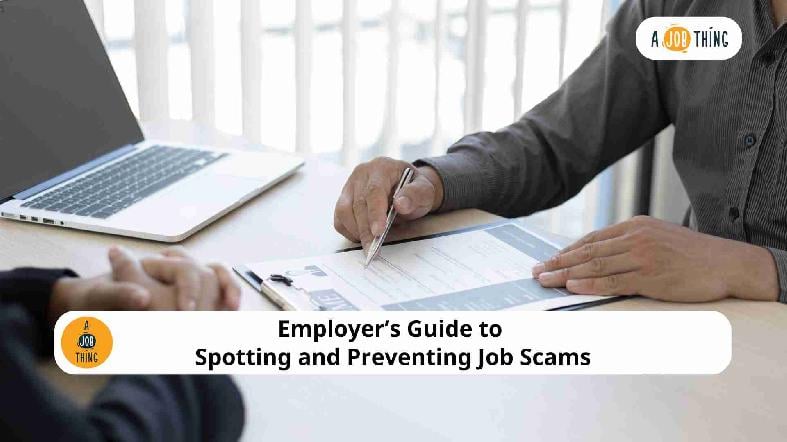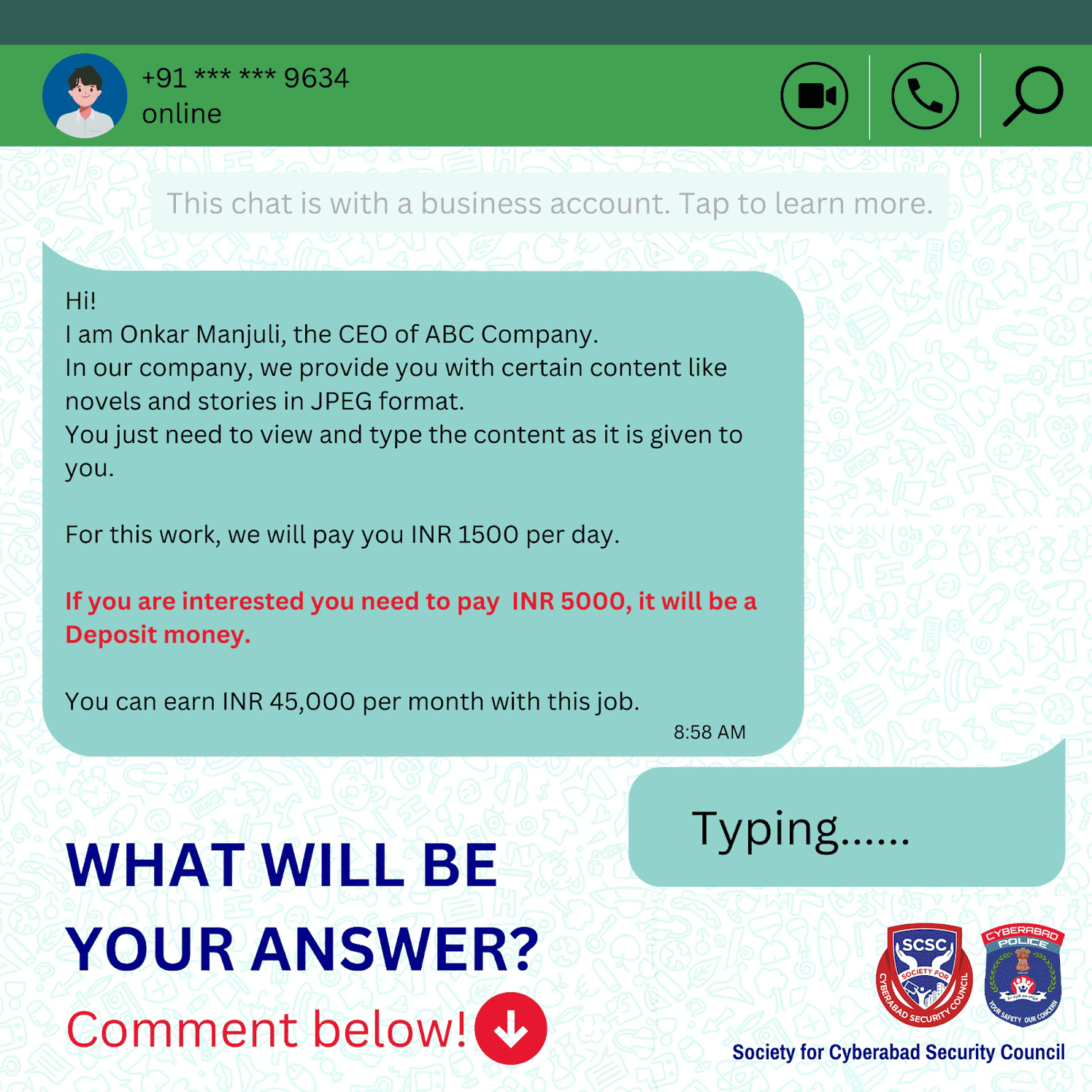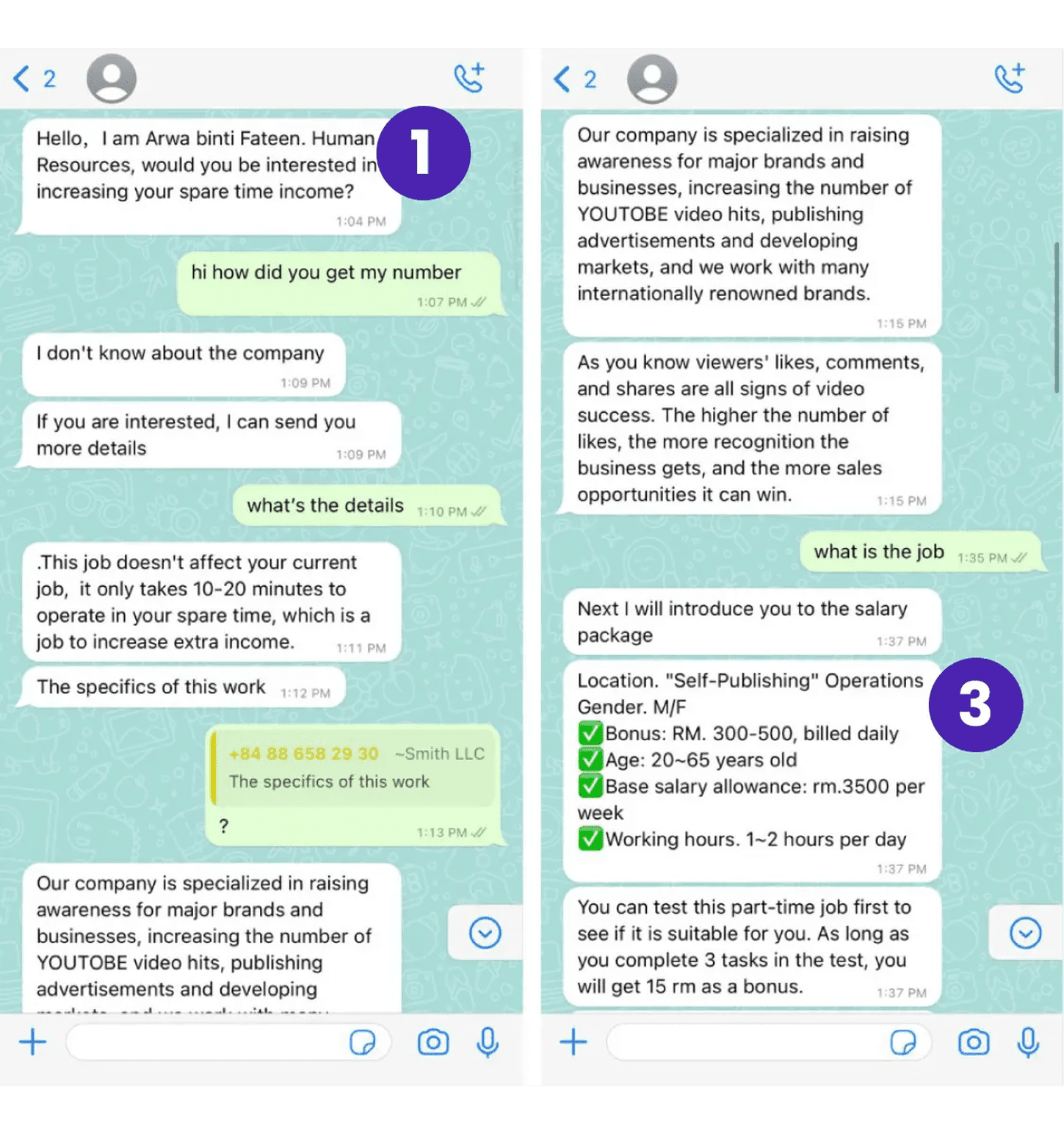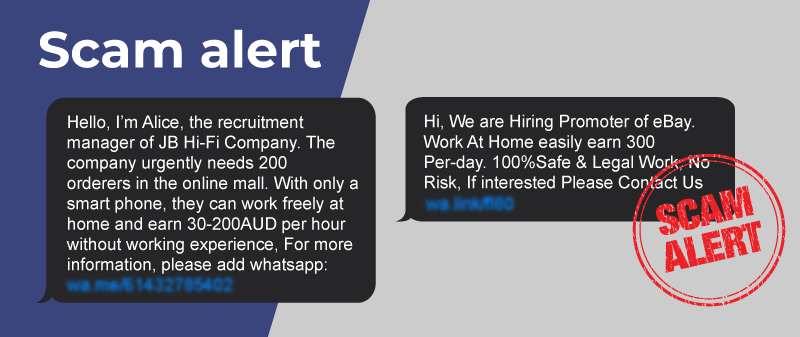
Employer’s Guide to Spotting and Preventing Job Scams
Are You Hiring?
Find candidates in 72 Hours with 5+ million talents in Maukerja Malaysia & Ricebowl using Job Ads.
Hire NowWith more job seekers searching for work online, job scams have become more common in Malaysia.
Scammers now use company names and branding to trick people into fake job offers.
These scams not only hurt job seekers but also damage a company’s reputation.
As an employer, it is important to know how these scams work, how to spot them, and how to protect your company’s brand.
What is a Job Scam?
A job scam is a fake employment offer designed to trick job seekers into giving away personal information, sending money, or doing free labour.
Scammers often impersonate real companies to make their job offers look believable.
Some of the most common scams include fake job offers, phishing for data, and upfront payment scams.
Types of Job Scams in Malaysia
Job scams in Malaysia come in various forms.
1. Fake job postings using legitimate company names
Scammers copy company names, logos, and even create fake job ads.
These postings often appear on unfamiliar websites or social media pages.
Victims are usually asked to send personal information or make a payment to proceed with the job application.
2. Recruitment agencies' impersonation
Some scammers pose as well-known recruitment agencies or claim to be partners of legitimate hiring firms.
They may ask job seekers to pay a registration or processing fee.
3. Telegram/WhatsApp phishing jobs
The scam involves contacting job seekers via messaging apps like WhatsApp or Telegram.
Scammers offer easy jobs with high pay and then request payment for training, equipment, or application processing.
4. Upfront payment job scams
Victims are told they’ve been hired and must pay a fee for registration, training, or background checks.
Once the payment is made, the scammer disappears.
5. Fake overseas job offers
These scams promise jobs abroad with attractive salaries.
Scammers ask job seekers to pay for visas, accommodation, or travel costs. After payment, the job seeker receives no further communication.
How Scammers Use Employer Brands
To make their scams look authentic, scammers often steal real company branding:
-
Logos and names in job ads
-
Fake websites and profiles that mirror your own
-
Posting listings on unverified or unfamiliar job platforms
Red Flags That Indicate Job Scams (give screenshot job scam)
Job seekers might report these warning signs, and they can also help employers detect fraud:
-
Upfront payment requests for processing, training, or onboarding.

Source: https://x.com/SCSC_Cyberabad/status/1811940207198871589
-
Bad grammar or using unofficial emails.

Source: https://www.jangankenascam.com/my/jenis-jenis-scam/scam-pekerjaan/
-
Immediate job offers without interviews.

Source: https://www.acma.gov.au/articles/2022-07/scam-alert-fake-job-offer-texts
-
Jobs posted on unfamiliar or suspicious platforms.
How Job Scams Affect Employers
Job scams that misuse your company name can damage your business in multiple ways.
When job seekers encounter fake job offers that appear to come from your company, they may lose trust in your brand.
This can hurt your reputation, especially if multiple complaints circulate online or on social media.
Your company logo and name being used in these scams without permission also undermines your professional image.
Moreover, you might see a drop in applications from quality candidates who are unsure whether your vacancies are genuine.
This disruption can affect your hiring pipeline and overall recruitment goals.
How to Identify If Your Company is Being Impersonated in a Job Scam
Employers can detect impersonation by looking out for specific signs:
-
Job seekers contact your company to verify unusual job offers.
-
Monitor platforms where your company does not normally advertise vacancies.
-
Misuse of brand assets
-
Online comments and complaints about fake job ads linked to your brand.
How Employers Can Prevent Job Scams
To reduce the risk of impersonation, companies can adopt proactive measures:
-
Use only trusted and verified hiring platforms to advertise your vacancies.
-
Make sure job seekers can contact you through official emails and verified company domains.
-
Add a visible scam alert section on your careers page with clear details about your hiring process.
-
Publish the names and contact details of real recruiters or hiring staff on your website.
What to Do If Your Company Is Targeted
If your brand is involved in a scam without your knowledge, take these actions immediately:
-
File a police report with local authorities to formally document the incident.
-
Report the impersonation to CyberSecurity Malaysia for investigation and support.
-
Share a public notice or warning on your official channels to inform job seekers.
-
Contact the job platform hosting the scam ad and request removal.
-
Reach out to affected individuals and provide correct information on your hiring process.
How A Job Thing Can Help Prevent Impersonation of Employers
A Job Thing uses a strict verification process to help protect employers from impersonation scams.
Every employer is required to submit official documentation, such as SSM certificates and identity cards, which are reviewed before an account is approved.
In addition, the A Job Thing team performs thorough checks on company email addresses, physical office locations, and phone numbers to confirm legitimacy.
This multi-step approach helps make sure that only real businesses can post jobs on the platform, reducing the chances of scammers using the site to impersonate your brand.
How to Help Job Seekers Avoid Scams
Employers can help prevent job seekers from falling into scams by offering guidance:
-
During interviews or job applications, explain clearly how your company manages hiring.
-
Share which platforms your company uses for job postings and who is authorised to contact applicants.
-
Use social media to alert your audience if a scam is reported.
When job seekers are informed and cautious, they are less likely to fall victim to scams linked to your company’s name.
FAQ
Q: What should I do if someone uses my company name in a scam?
A: Report to the police, CyberSecurity Malaysia, and the platform where the scam appeared. Publish a public warning.
Q: Are companies legally liable for impersonation scams?
A: No, but companies are expected to respond responsibly and protect their reputation.
Q: How can I notify job seekers of legitimate hiring practices?
A: Use your website and social channels to explain your recruitment process and provide verified contact points.
Q: Can I report scam job listings on job portals?
A: Yes. Most platforms allow employers to report suspicious activity or misuse of company names.
Q: What is the role of CyberSecurity Malaysia in job scams?
A: They investigate cybercrimes and offer support for online fraud reports involving impersonation.
Hire Safely, Without the Scam Risk
With AJobThing, your company name is protected and jobseekers are assured they’re applying to real opportunities.
Post your job ads today & simplify your hiring process!
Read More:
- Minimum Age Working in Malaysia and Employer Responsibilities
- Kenapa SOCSO Ditolak dalam Gaji? | Why is SOCSO Deducted from Salary?
- How to Handle Cuti Bersalin Swasta in Your Company
- What to Include in an Exit Interview Form (With Template & Example)
- Full LHDN Stamp Duty Guide on Malaysia Employment Contract [2025]: Penalties, Exemptions, & More
- How Employers Can Embrace National Work From Home Day in 2025
- How to Handle Employees Who Abscond from Work in Malaysia
- Dependant Pass Malaysia 2025: Eligibility, Process, and HR Tips
- Who Can Look at Employee Personnel Files?
- Why a Clear Signing Off From Work Policy Matters
- What is Work Life Balance? Benefits, Factors, and How to
- 75 Company Gift Ideas for Employee Resignation
- 150+ Nama Nama Company Yang Best to Inspire Your Business Name
- Jadual Caruman KWSP 2024/2025 (EPF Contribution Schedule)
- EPF Voluntary Contribution in Malaysia: How It Works & Benefits
- STR 2025 (Sumbangan Tunai Rahmah): Eligibility, Payment Dates & How to Apply
- CP22 Form: Deadline, Free Download Form, How to Fill
- CP204: Deadline, Calculation, & Free Download Form
- How to Use ByrHASiL for Online Tax Payments in Malaysia
- PCB Deduction in Malaysia: Calculation, Rates & Employer Guide
- What is the 182 Days Rule in Malaysia? Tax Residency Explained
- Labour Law Malaysia Salary Payment For Employers
- Best Answers for 'Why Should We Hire You' – A Guide for Employers
- 12 Employment Types You Need to Know: A Guide for Employers
- What is Precarious Employment? Risks, Challenges, and Solution
- New EPF Retirement Savings: Helping Employers Support Financial Well-Being for Employees
- Higher Pensioners in 2024, Government Set to Finalize Pension Rates
- Lack of Diversity in Candidate Pool: Why It Matters and How to Improve It

